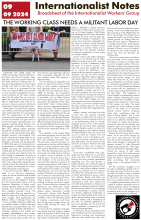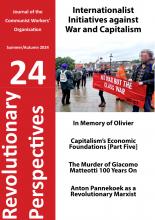November 2024
Coronavirus & the write off of value.
Question. How much impact is the shutdown of work and everyday life likely to have on capital values in the coming period? Just been talking to someone i know whose family had steel company and now just rents out a couple of factories. I wont repeat some of nonsense he said about the situation but he was making an interesting point about commercial rents, stock and equipment. Profits levels have been too low for SMEs to have emergency funds to support themselves during a shutdown. Commercial landlords wont receive rents, SMEs will be at a standsill and stock and machinery buildings after a period of disuse will lose a lot of value. He foresees lots of bankruptcy on all sides despite loans for wages etc. These firms dont have cash in hand to protect themselves so there will vultures around at the end of the shutdown buying up capital at a cutdown price.
OK this is not quite the same level of damage that a world war does but if this shutdown is extensive there seems a possibility of the devaluation of capital impacting on the economy.
Start here...
- Navigating the Basics
- Platform
- For Communism
- Introduction to Our History
- CWO Social Media
- IWG Social Media
- Klasbatalo Social Media
- Italian Communist Left
- Russian Communist Left
The Internationalist Communist Tendency consists of (unsurprisingly!) not-for-profit organisations. We have no so-called “professional revolutionaries”, nor paid officials. Our sole funding comes from the subscriptions and donations of members and supporters. Anyone wishing to donate can now do so safely using the Paypal buttons below.
ICT publications are not copyrighted and we only ask that those who reproduce them acknowledge the original source (author and website leftcom.org). Purchasing any of the publications listed (see catalogue) can be done in two ways:
- By emailing us at uk@leftcom.org, us@leftcom.org or ca@leftcom.org and asking for our banking details
- By donating the cost of the publications required via Paypal using the “Donate” buttons
- By cheque made out to "Prometheus Publications" and sending it to the following address: CWO, BM CWO, London, WC1N 3XX
The CWO also offers subscriptions to Revolutionary Perspectives (3 issues) and Aurora (at least 4 issues):
- UK £15 (€18)
- Europe £20 (€24)
- World £25 (€30, $30)
Take out a supporter’s sub by adding £10 (€12) to each sum. This will give you priority mailings of Aurora and other free pamphlets as they are produced.
ICT sections
Adverts
Glasgow Bookfair
RED AND BLACK CLYDESIDE BOOKFAIR
The CWO will have a stall at the Red and Black Clydeside Bookfair, there will also be an NBWCW meeting.
When: Saturday, 7 December 2024
Where: Quaker Meeting House, 38 Elmbank Cres, Glasgow G2 4PS
Belfast Bookfair
BELFAST RADICAL BOOKFAIR
The CWO will have a stall at the Belfast Radical Bookfair.
When: Saturday, 30 November 2024
Where: Peter Froggatt Centre (3rd Floor), 7-9 College Park E, Belfast BT7 1PS
IWG Meetings
IWG MEETINGS
The IWG will be holding regular in-person meetings where sympathizers are encouraged to come and get in contact.
New York: Last Saturdays of the month 3:30pm at Peculier Pub (145 Beecker St)
Philadelphia: Last Saturdays of the month 11am at B2 cafe (1500 E Passyunk Ave)
Columbus: Last Sunday of every month, from 8PM-10PM, at Kafe Kerouac (2250 N High St, Columbus, OH).
Los Angeles: Please contact to get in touch.
Means of contact:
Email: us@leftcom.org
Instagram: @iwg.official
Facebook: @iwgusa
Twitter: @IWGOfficial
Recent publications
Aurora is the broadsheet of the ICT for the interventions amongst the working class. It is published and distributed in several countries and languages. So far it has been distributed in UK, France, Italy, Canada, USA, Colombia.
November 2024
- Editorial
- Indigenous Radicalism Pursues Reconciliation with Capital
- Sahel : Locus of Imperialism in Africa?
- Return of Inflation: A Review
- Populism, Trumpism, and Democracy - How About Communism?
- Capitalism's Environmental Destruction & Imperialism
1919 is the journal of the two North American affiliates of the ICT, Klasbatalo and Internationalist Workers' Group.
September 2024
Mutiny is the bulletin of Klasbatalo. Mutinerie est le bulletin de Klasbatalo.
Out now!
Journal of the Communist Workers’ Organisation -- Why not subscribe to get the articles whilst they are still current and help the struggle for a society free from exploitation, war and misery? Joint subscriptions to Revolutionary Perspectives (3 issues) and Aurora (our agitational bulletin - 4 issues) are £15 in the UK, €24 in Europe and $30 in the rest of the World.
Written by Jock Dominie. £12, 276pp.
The Russian Revolution remains a landmark event in history. For the bourgeois historians, the October Revolution is thought to be a tragedy that set back the achievements of the “democratic” February Revolution, and allowed the Bolsheviks to wreak havoc on their citizens and the world. For the Stalinists, the events of 1917 paved the way for the birth of the USSR, which they point to as a prototypical example of “socialism in one country”. In reality, the February and October Revolutions were both part of the same proletarian revolution.
The book can be ordered by emailing us at uk@leftcom.org and asking for our banking details, or by donating the cost of the publications required via Paypal using the “Donate” button. Postage charges should be added. If in the UK, and paying direct to our bank account, first class postage is free. If via Paypal add £2. For Europe cost of a copy with postage is €20 (EUR), for Australia it is $42 (AUD) and for the USA and anywhere else in the world it is $27 (USD).
User login

This work is licensed under a Creative Commons Attribution 3.0 Unported License.









That question is a bit too
That question is a bit too broad isnt it. I know that it all depends on too much in the future particularly how long the shutdown will be but it seems an interesting issue to follow.
I agree it's an interesting
I agree it's an interesting issue, and hope the CWO will respond. My muddled thought is that the massive devaluation of WW2 was exploited by a USA that had not suffered destruction like the rest of the globe and could benefit accordingly. Today, all states are impacted. Historically, devaluation serves to lower capital costs for capital allowing a new round of accumulation. Today, though? Destruction of production and jobs takes place against a global backdrop of already enormous debt. Gordon Brown might be calling for an international response but we know this wont happen.
This leftist piece is interesting: novaramedia.com
Link
Link
Sorry not to reply earlier but something seems to have gone wrong with the notifications on our site as all the editors are supposed to get instant messages of any post. I see that there are posts on the site that predate yours which we were not aware of! Thanks to Shug for emailing to draw our attention to your exchange. I have forwarded your question to other comrades but I think you have already highlighted one factor which makes any response currently a little speculative (if I can use that term in a discussion like this!) is that we do not yet know how long this crisis will last and time will be a factor in determining its impact.
What the coronavirus crisis shares with an generalised imperialist war situation is a) it affects the whole planet and b) the nature of the crisis allows states to make changes to the functioning of private property WITHOUT this calling into question the whole system based on private property itself.
Coincidentally Mario Draghi, former President of the ECB who famously responded to 2007-8 with the words "we'll do what it takes" (and then got away with doing a lot less than his counterparts in the USA) has written that (European) governments have to intervene now, not just to compensate for lost wages, but to prevent massive layoffs (of the kind that are already happening but much more viciously in the US). He basically is saying that all private debt that is incurred should be backed by the state and transferred to state indebtedness (sinee he expects interest rates to go up and therefore to turn all those zombie companies (estimated at 16% of the total in the US) into dead companies. He seems to be arguing that they can just print the money and then worry about how they dispose of the debt afterwards (he doesn't openly say it but writing it off seems to be an option). All this is designed to ensure that capital investment picks up once again as soon as the emergency is over.
There is an obvious problem here in that it would basically preserve the continuing crisis as it was when they began the year. Devaluation would be minimised and he would be relying on the pick up in economic activity to provide the boost to the economy so desperately lacking since 2008. In other words he is saying that rather than let the crisis be the "cure" for the overaccumulation and ergo the low rate of profit the stagnation would go on. One of the boosts to investment after WW2 was the absolute physical destruction of value. Draghi's "solution" would not come close to doing this and at best we would have "moral depreciation" so that stagnation would go on. But then Draghi's idea is only his suggestion and it may not be taken up in the way that he advocates. The aficionados of Keynesianism and Modern Monetary Theory will though all be advocating similar state action ("universal basis income" is already back from the dead).
What might be the most interesting consequence is the cureent recognition by so many workers across the globe that they count for nothing when it comes to making profits. Their struggles to shut workplaces may be the beginning of something wider. Who knows? We have long been in uncharted territory and certainly need to keep our eyes open and brains alert to what is happening. So thanks for your question to which this is a first, and no doubt unsatisfactory, response. I imagine others can add more.
I agree with Shug that one of
I agree with Shug that one of the major factors in the period of reconstruction after the war was that the USA came out fairly unscathed and was able to support reconstruction. That wont be the case after this pandemic whatever the length and its also true that it took some time after the end of the war for the economies to get really going again anyway. The levels of debt may also play a role here although overall the debt to gdp ratio at end of WW2 was 250 - 300% and we arent at that level yet - as above though a lot of it was owed to the USA presumably not evenly spread out.
C points out that the ruling class seems now to be converted back to keynesianism with this wholsele accepted of greater debt which will be interesting to see how that works out. I am not sure i understand the point about Drahi's solution though. What is 'moral depreciation'? If we do experience a significant depreciation of assets rather than its physical destruction wont that still give the B a chance to upgrade technology still - maybe the stage 4 revolution that that article on robotic technology mentions.
Last point, i absolutely agree about the reaction of workers to the pandemic and the need to be alert. It seems to me that the most important point about the pandemic is that in a period of widespread risk to health, capitalism remains so
focussed on financial issues, costs, profits and bankruptcies and so forth. Nothing demonstrates more the obsolescence of a money based system and how money itself is a fetter to the development of human society.
Link I think you know what
Link I think you know what "moral depreciation" means as you give a fairly decent summary in the next sentence.
In Capital Vol 1 Chap 15 Marx takes a look at Ricardo's view that the introduction of new technology save "But in addition to the material wear and tear, a machine also undergoes what one might call a moral depreciation. It loses exchange-value, either because machines of the same sort are being produced more cheaply than it was, or because better machines are entering into competition with it. In both cases, however young and full of life the machine may be, its value is no longer determined by the necessary labour-time actually objectified in it, but by the labour-time necessary to produce either it or the better machine. It has therefore been devalued to a greater or less extent"
Ricardo was arguing that machines would shorten the working day but Marx pointed out that on the contrary they would increase it as employers wanted to avoid "moral depreciation" so any investment they took out would have to be accompanied by flogging machines and workers to death to avoid that very "moral depreciation" he describes. He concludes "The shorter the period taken to reproduce [the machine's] total value, the less is the danger of moral depreciation; and the longer the working day, the shorter that period in fact is".
And this is what brings us back to where we are. Moral depreciation is not enough to restart capital accumulation - only actual physical destruction of a mass of value or the total write off of existing capital values can open up the way for a new round of accumulation. But the capitalists won't want to write off their existing values and so the likelhood of the same merry-go-round of increasing debt will continue - and with it the danger of yet another massive crash. The key thing in this crisis seems to be the response of the working class - they are striking for life (shut down the factories while still paying a living wage). The capitalists and social democrats (in economic terms Keynesians) are in agreement on emergency payments now but when the emergency is over what will they demand next from the working class? This seems to be the key thing and as you rightly say the coronavirus emergency has revealed in the starkest terms just what the priorities of this rotten system are.